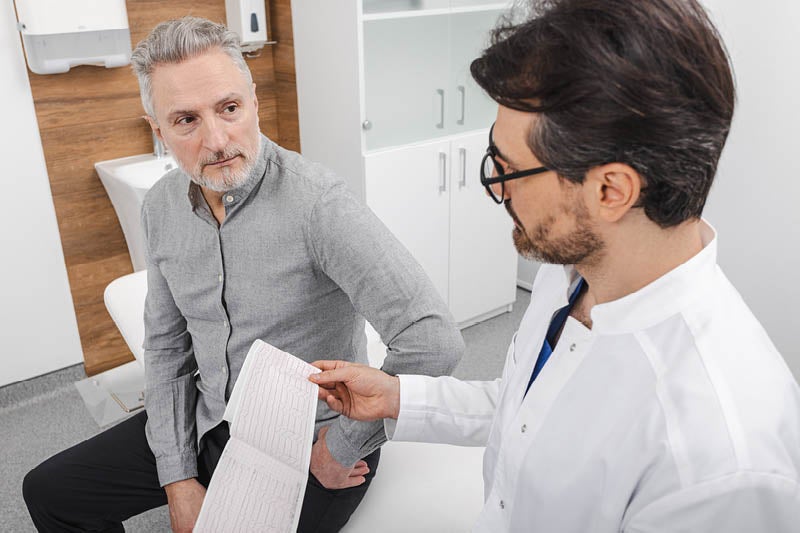Atrial Fibrillation: Get in sync with this common heart rhythm problem
August 12, 2025Categories: Heart Care

Overview: Is your heart racing or all aflutter? You may have atrial fibrillation, the most common heart rhythm disorder. Take heart: If left untreated, it can make you five times more likely to have a stroke. The good news? New advances offer more treatment options than ever.
A racing heart...heart palpations...a fluttering inside the chest...an uneven heartbeat. That’s how you may feel if you have atrial fibrillation, the most common type of irregular heartbeat affecting millions of people.
The good news? There are many safe and effective treatments today, including exciting new minimally invasive procedures that are changing the way doctors manage this condition.
What is AFib?
Atrial fibrillation, called AFib, is an irregular, often rapid heartbeat that happens when the upper chambers of your heart don’t beat in sync with the lower chambers. Instead of a steady rhythm, the heart quivers or flutters.
“Your heart is going much faster and very irregularly for a prolonged period of time when you’re at rest,” explained MercyOne electrophysiologist Victor Abrich, MD, who specializes in heart rhythm disorders. “Just imagine if you were forced to be on a treadmill for 24 hours a day, seven days a week and not allowed to rest. That’s what’s happening to the heart if you’re in uncontrolled atrial fibrillation for a prolonged period.”
Expert care for heart arrhythmias
What's the big deal?
It’s important to treat AFib because it can significantly increase your risk for heart attack and stroke. In fact, AFib makes you five times more likely to have a stroke.
What are common symptoms of AFib?
- Suddenly feeling like your heart is racing, pounding, fluttering or missing a beat.
- Shortness of breath
- Fatigue
- Feeling dizzy or lightheaded
- Chest pain or tightness
AFib is often diagnosed in the emergency department. However, some people don’t feel any symptoms at all and may discover they have AFib during a routine exam or through tests for something else.
What are risk factors for AFib?
- Age: The risk for AFib increases significantly as you get older.
- Sleep apnea: Studies have shown a strong link between sleep apnea and AFib.
- Uncontrolled high blood pressure: A major risk factor for AFib.
- Alcohol: Alcohol consumption, even in moderate amounts, can increase the risk of AFib and exacerbate existing AFib.
- Obesity: Obesity is a significant contributor to AFib.
- Diabetes: Individuals with diabetes have a stronger risk for AFib.
- Other factors: Family history, heart valve problems and lung and kidney disease can also lead to AFib.
Treatment options for AFib
Treatment for AFib depends on the type, your symptoms and your overall health. Options may include:
Medications
- Blood thinners (like warfarin or newer options such as Eliquis or Xarelto) to reduce your stroke risk.
- Rate control medications to slow down your heartbeat.
- Rhythm control medications to help restore a normal rhythm.
Minimally invasive procedures
- Cardioversion: A quick, low-risk procedure that uses a controlled electrical shock to reset your heart to a normal rhythm.
- Catheter Ablation: A procedure that uses heat (radiofrequency) or cold (cryoablation) to target and disable the small areas in the heart causing abnormal rhythms.
- Pulsed Field Ablation (PFA): A new technique that uses targeted pulses of electrical energy, rather than heat or cold, to isolate the heart tissue causing AFib. Unlike traditional ablation, it’s designed to minimize damage to surrounding healthy tissue, such as the esophagus or nerves. PFA is faster, more precise and has shown promising early results in reducing complications. It’s gaining traction as a go-to option as it becomes more widely available.
Stroke prevention: WATCHMAN™ Device
If you have AFib that isn’t caused by a heart valve problem (called non-valvular AFib) and can’t take blood thinners for the long term, the WATCHMAN™ device may be an option.
This small, umbrella-like device is placed in the heart’s left atrial appendage, where blood clots tend to form in AFib. It permanently seals off this area to reduce stroke risk—without the need to take blood thinners for life. The WATCHMAN™ Device is minimally invasive and placed through a catheter in the leg. Most patients go home the next day.
Exciting innovations
Atrial fibrillation may be common, but it’s treatable—and new innovations like pulsed field ablation and the WATCHMAN™ device can give you more options to live your best life and reduce your risks.
If you’ve been diagnosed with AFib, talk with your doctor or a heart rhythm specialist (called an electrophysiologist) to find out which treatments are best for you.
Check your heart health. Take our quiz!
Stay connected to your heart health with MyChart.
This blog was medically reviewed by a MercyOne provider.
